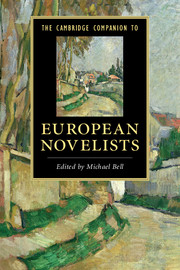Book contents
- Frontmatter
- Introduction: The novel in Europe 1600–1900
- 1 Miguel de Cervantes (1547–1616): Don Quixote: romance and picaresque
- 2 Daniel Defoe (1660–1731): Journalism, myth and verisimilitude
- 3 Samuel Richardson (1689–1761): The epistolary novel
- 4 Henry Fielding (1707–1754): The comic epic in prose
- 5 Jean-Jacques Rousseau (1712–1778): The novel of sensibility
- 6 Laurence Sterne (1713–1768): The fiction of sentiment
- 7 Johann Wolfgang von Goethe (1749–1832): The German Bildungsroman
- 8 Walter Scott (1771–1832): The historical novel
- 9 Stendhal (1783–1842): Romantic irony
- 10 Mary Shelley (1797–1851): The Gothic novel
- 11 Honoré de Balzac (1799–1850): ‘Realism’ and authority
- 12 Charles Dickens (1812–1870): Englishman and European
- 13 George Eliot (1819–1880): Reality and sympathy
- 14 Gustave Flaubert (1821–1880): Realism and aestheticism
- 15 Fyodor Dostoevsky (1821–1881): ‘Fantastic realism’
- 16 Leo Tolstoy (1828–1910): Art and truth
- 17 Émile Zola (1840–1902): Naturalism
- 18 Henry James (1843–1916): Henry James's Europe
- 19 Marcel Proust (1871–1922): A modernist novel of time
- 20 Thomas Mann (1875–1955): Modernism and ideas
- 21 James Joyce (1882–1941): Modernism and language
- 22 Virginia Woolf (1882–1941): Re-forming the novel
- 23 Samuel Beckett (1906–1989): Language, narrative, authority
- 24 Milan Kundera (1929–): The idea of the novel
- Conclusion: The European novel after 1900
- Further reading
- Index
- Cambridge Companions To …
Conclusion: The European novel after 1900
Published online by Cambridge University Press: 28 September 2012
- Frontmatter
- Introduction: The novel in Europe 1600–1900
- 1 Miguel de Cervantes (1547–1616): Don Quixote: romance and picaresque
- 2 Daniel Defoe (1660–1731): Journalism, myth and verisimilitude
- 3 Samuel Richardson (1689–1761): The epistolary novel
- 4 Henry Fielding (1707–1754): The comic epic in prose
- 5 Jean-Jacques Rousseau (1712–1778): The novel of sensibility
- 6 Laurence Sterne (1713–1768): The fiction of sentiment
- 7 Johann Wolfgang von Goethe (1749–1832): The German Bildungsroman
- 8 Walter Scott (1771–1832): The historical novel
- 9 Stendhal (1783–1842): Romantic irony
- 10 Mary Shelley (1797–1851): The Gothic novel
- 11 Honoré de Balzac (1799–1850): ‘Realism’ and authority
- 12 Charles Dickens (1812–1870): Englishman and European
- 13 George Eliot (1819–1880): Reality and sympathy
- 14 Gustave Flaubert (1821–1880): Realism and aestheticism
- 15 Fyodor Dostoevsky (1821–1881): ‘Fantastic realism’
- 16 Leo Tolstoy (1828–1910): Art and truth
- 17 Émile Zola (1840–1902): Naturalism
- 18 Henry James (1843–1916): Henry James's Europe
- 19 Marcel Proust (1871–1922): A modernist novel of time
- 20 Thomas Mann (1875–1955): Modernism and ideas
- 21 James Joyce (1882–1941): Modernism and language
- 22 Virginia Woolf (1882–1941): Re-forming the novel
- 23 Samuel Beckett (1906–1989): Language, narrative, authority
- 24 Milan Kundera (1929–): The idea of the novel
- Conclusion: The European novel after 1900
- Further reading
- Index
- Cambridge Companions To …
Summary
As the story of the novel moves into the modernist decades, it is especially necessary to guard against the progressive fallacy. For although writers constantly create new forms out of the perceived limitations of their predecessors, this does not necessarily imply, as it would in the natural sciences, that the new is an advance. Hence, while the present account focuses on major new directions in the idea and practice of fiction in the twentieth century, every variety of the novel that has been invented continues to be practised and, above all, the omniscient realist narrative, as developed over the two preceding centuries, remains a mainstay of the genre not just numerically but qualitatively.
At the same time, as indicated in the preceding essays, the novel has at all times reflected on the ambiguity of its narrative premises which can be understood both as literary conventions and as extra-literary truth claims. And as the sense of a social whole becomes more problematic, so it matters more to determine what sort of truth the novel tells: historical, moral, poetic? All of the above, no doubt, but which most essentially? Is failure in one of them more damaging than in others? Does poetic power give dangerous conviction to historical falsehood? As such questions especially pressed themselves on European writers at the end of the nineteenth century, the literary imagination was frequently polarised into two contrary possibilities.
- Type
- Chapter
- Information
- The Cambridge Companion to European Novelists , pp. 428 - 443Publisher: Cambridge University PressPrint publication year: 2012
- 1
- Cited by



